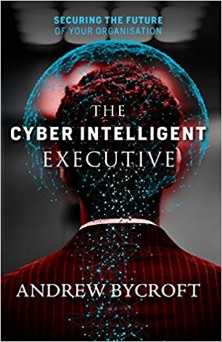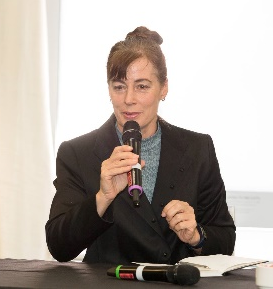 Book review - The Cyber Intelligent Executive by Andrew Bycroft.
Book review - The Cyber Intelligent Executive by Andrew Bycroft.
ISBN 978-0-9944208-0-0
Directors are forewarned: No organisation is immune. We all know that! Yet sometimes - especially when reading detailed technical reports about the problem - it is tempting to hope that IT have it all under control.
This book is short, written in plain English, and provides the key information your board needs to to start the cyber-security conversation.
In The Cyber Intelligent Executive, you will discover:
-
The true impact of cyber threats
-
Why cyber attacks are a business problem, not an IT problem
-
The right security goal for your organisation
-
Which are your most valuable, and vulnerable, information assets, and how to protect these
-
The six sources of cyber threats, and how to predict and prevent these
-
How to detect and respond to cyber attacks to minimise the damage your enemies can wreak; and
-
The three categories of cyber breaches, and how to quickly return to generating revenue in the midst of a breach.
Prepare your board to become the fierce leader your organisation needs in the cyber age.
The business landscape is transforming dramatically, with technological innovations opening a new world of possibilities for today's leaders. However, these opportunities come at a price, and you will struggle to survive the cyber enemies targeting your organisation unless you start by ensuring management is taking the right action right now.
This book will help you to ask the questions you need to ask to diagnose how cyber-aware your executive team is, and - more important - what needs to be done to improve your cyber security.
Available at Amazon.com in paperback format only.
What's New - In July
 In August I had a few minutes of fame as an expert governance commentator on ABC News.
In August I had a few minutes of fame as an expert governance commentator on ABC News.
I provided some background on the boardroom issues arising from the AUSTRAC filing of a statement of claim against Australia's largest bank for over 53,000 individual breaches of the anti-money laundering and terrorism financing legislation. You can follow the story here and here.
I also enjoyed some more conference and in-house training sessions.
One of the highlights was the course for FDB in Bangkok "Achieving Board Effectiveness" as this vibrant city was matched only by the sparkle of my group. We had a wonderful two days together and I'm sure there will be a few boards benefitting from the results.
 I also enjoyed the Adding Value as a Director Course presented for Konnect Learning in Sydney. Great to have a small group and go deep into practical strategies for improving personal and company effectiveness.
I also enjoyed the Adding Value as a Director Course presented for Konnect Learning in Sydney. Great to have a small group and go deep into practical strategies for improving personal and company effectiveness.
Add to that the joy of getting better acquainted with my latest board and some exciting opportunities coming up and you have a full month.
I am always keen to work more and will be delighted to hear from you if you would like to arrange some board education or a performance review!
Inspirational quote for September - This month my favourite quote is:
“Board directors are not fine wines that improve with age,
but more like craft beers that give their best while still fresh.”
~ Mike O'Donnell ~
I slightly disagree because it is often a great asset to have a really experienced director on the board; they have access to so much corporate memory and experience. I slightly agree because fresh new ideas and energy are necessary for progress. Balance and diversity of tenure add value. Either way, Mike made me think (hard) when he said this.
Let's meet - I love the opportunity to meet readers (and anyone who is interested in governance) so it would be great to see you at one of my upcoming events that are open to the public:
-
A workshop seminar on Presenting to Board Directors & Senior Executives in New Zealand on Wednesday 20 September at the Novotel Ellerslie.
-
The National Governance Conference being held on Thursday 21 September, also in New Zealand.
-
Taiwan Corporate Governance Association "Corporate Governance Summit XIII: Creating Corporate Value through Enhancing Functions of Board" in Taipei on 25 October followed by a masterclass workshop on 26 October.
If you would like me to speak for or train your board, staff, audience and/or group please contact me julie@mclellan.com.au.
A note on names - A few readers have asked me where I find the names for the protagonists in each case study. I can only say that I 'borrow' them from people I meet or things that I read. Scott is the name of one of my favourite sparring partners and is an old Scottish name meaning 'Wanderer'. Our protagonist will need to wander through a few difficult conversations and decisions as he wrestles with this dilemma!
This newsletter - If you have any ideas for improving the newsletter please let me know. If you are reading a forwarded copy please visit my website and sign up for your own subscription.
Suggestions for dilemmas - Thank you to all the readers who have suggested dilemmas. I will answer them all eventually. I could not write this newsletter without your help and without the generous help of all the experts who respond each month to the case studies.
Be a contributor - if you would like to attempt a response to the dilemmas for publication you will be most welcome. Simply reply to this email and let me know.
Farewell until the next issue (due 1 October 2017). I look forward to greeting you again then. In the interim I hope you will enjoy health, happiness and hard work.
Enjoy governing your corporations; we are privileged to do what we do!
Best regards,
Julie
 Contact me to arrange for a practical board workshop or conference presentation for your organisation.
Contact me to arrange for a practical board workshop or conference presentation for your organisation.
 The relationship between the Board & the CEO is a key factor in the effective governance of any organisation.
The relationship between the Board & the CEO is a key factor in the effective governance of any organisation. First Scott should review his 'strong formal controls' to ensure that they remain appropriate as government preferences change to a lesser number of larger contracts.
First Scott should review his 'strong formal controls' to ensure that they remain appropriate as government preferences change to a lesser number of larger contracts. Dear Scott,
Dear Scott,
 In August I had a few minutes of fame as an expert governance commentator on ABC News.
In August I had a few minutes of fame as an expert governance commentator on ABC News. I also enjoyed the Adding Value as a Director Course presented for Konnect Learning in Sydney. Great to have a small group and go deep into practical strategies for improving personal and company effectiveness.
I also enjoyed the Adding Value as a Director Course presented for Konnect Learning in Sydney. Great to have a small group and go deep into practical strategies for improving personal and company effectiveness.
